In today's competitive landscape, knowing your customer is no longer enough; you need to understand them instantly and in context. From streamlining onboarding flows to personalizing user experiences, the right data is the difference between a generic product and a memorable one. However, manually sourcing, verifying, and updating company and user data is slow, error-prone, and unscalable. This is where data enrichment companies come in. They provide the APIs and platforms to transform a single data point, like an email, domain, or phone number, into a rich, actionable profile.
This guide breaks down the top 12 providers, including Brand.dev, ZoomInfo, and People Data Labs, comparing their core strengths, ideal use cases, and key limitations. We cut through the marketing jargon to give you a clear, practical comparison. Many data enrichment companies, for instance, offer specialized Data Quality Services as a core part of their offerings, ensuring the information you receive is both accurate and current.
Whether you're a developer building a personalized onboarding flow, a fintech enriching transaction data, or an AI team training LLMs with branded assets, this list is for you. We'll help you find the best solution for your specific needs, be it for sales intelligence, B2B marketing, or product-led growth. Each entry includes direct links and key details to simplify your evaluation process, helping you choose the right partner to power your product, sales, or growth stack.
1. Brand.dev
Website: https://brand.dev
Brand.dev establishes itself as a premier choice among data enrichment companies by delivering a developer-first "Brand API" that goes far beyond simple logo retrieval. It provides complete, structured brand kits from a single query using a domain, company name, or stock ticker. This unique focus on comprehensive brand identity, including logos, color palettes, typography, and full style guides, makes it an exceptionally powerful tool for creating deeply personalized and brand-consistent user experiences.
What truly sets Brand.dev apart is its single-source retrieval of rich, actionable brand assets. While many services offer logos, Brand.dev provides the entire visual system, including fonts and style guides, which is crucial for applications that need to generate on-brand UIs, marketing assets, or personalized communications. Its robust SDKs for TypeScript, Python, and Ruby, combined with clear documentation and live demos, facilitate remarkably fast integrations, often completed in under 30 minutes.
Key Features & Use Cases
- Comprehensive Brand Kits: Retrieve logos, colors, typography, fonts, backdrops, and social links from a single API call.
- Developer-First Tooling: Offers well-maintained SDKs, Zapier integration, and self-serve API keys for immediate implementation.
- Automated Onboarding Personalization: Instantly prefill user sign-up forms and automatically theme application UIs with the user's company branding, significantly boosting activation rates.
- Fintech & Billing Enrichment: Enhance transaction line items, invoices, and financial dashboards with accurate company logos and brand data for improved clarity.
- AI & LLM Content Generation: Power generative AI applications to create brand-consistent images, copy, and user interfaces by feeding them live brand context.
Pricing & Implementation
Brand.dev offers self-serve API access, allowing developers to start building immediately without requiring a credit card. Teams should consult the official pricing page for details on production-level usage, rate limits, and scalable plans. The platform's design prioritizes a frictionless developer experience, backed by case studies highlighting rapid time-to-value and tangible business outcomes.
2. ZoomInfo
ZoomInfo is an enterprise-grade B2B intelligence platform deeply entrenched in the sales and marketing technology stack, particularly within the US market. While known primarily for its sales intelligence interface, its core strength as one of the top-tier data enrichment companies lies in its robust API and native CRM integrations. Teams can programmatically enrich leads, contacts, and accounts with firmographic, technographic, and intent data directly within their existing workflows.
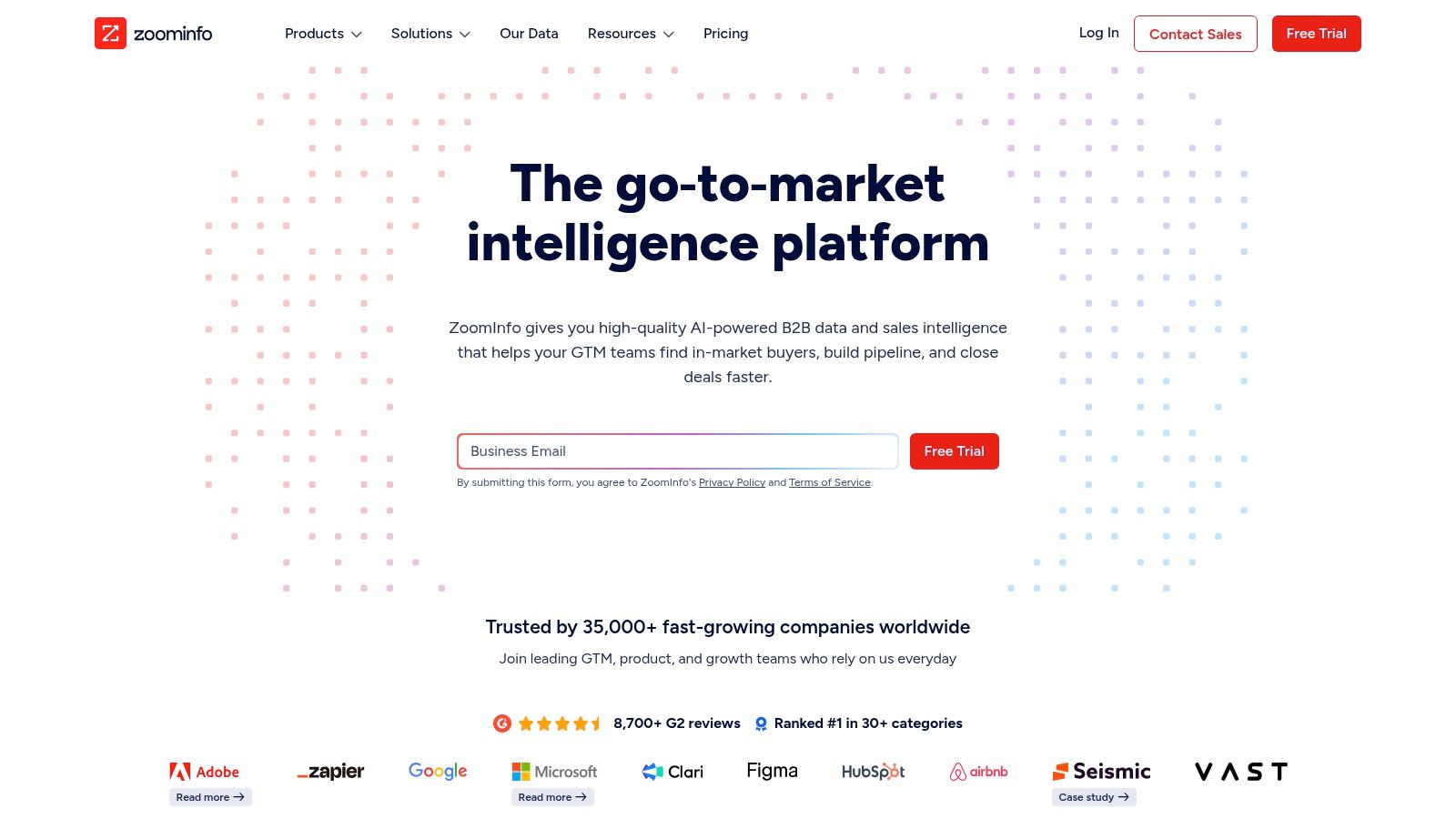
The platform operates on a credits model, where actions like data exports or API calls consume credits from an annual pool. This model supports both bulk enrichment for cleaning a database and real-time enrichment for new sign-ups. ZoomInfo excels at providing a comprehensive, albeit costly, data foundation for go-to-market teams aiming to operationalize their data strategy at scale. For a deeper dive into its capabilities, you can explore more about B2B data enrichment with ZoomInfo.
Key Features & Use Cases
| Feature | Best For | Implementation |
|---|---|---|
| Bulk & Real-Time Enrichment | Populating CRM/CDP pipelines | Native Salesforce/HubSpot sync or API |
| Intent & Technographics | Prioritizing outreach, identifying tech stacks | Add-on modules to the core platform |
| Contact & Company Data | Sales prospecting, account-based marketing | Direct platform access and CRM integration |
Pros:
- Extensive B2B data coverage, especially strong in North America.
- Mature, deep integrations with major CRMs and marketing automation platforms.
- Broad ecosystem with add-ons for sales engagement, workflows, and intent signals.
Cons:
- Pricing is not public and typically requires a sales-led process with annual contracts.
- Can be very expensive, and the total cost of ownership increases with necessary add-ons.
3. HubSpot Breeze Intelligence
For teams deeply embedded in the HubSpot ecosystem, Breeze Intelligence (the successor to HubSpot Insights) offers a streamlined, native approach to data enrichment. Rather than being a standalone platform, it functions as an integrated feature within HubSpot's CRM, allowing users to enrich company and contact records directly. This makes it an ideal solution for organizations looking to enhance their existing HubSpot data without adding another vendor or complex integration to their tech stack.
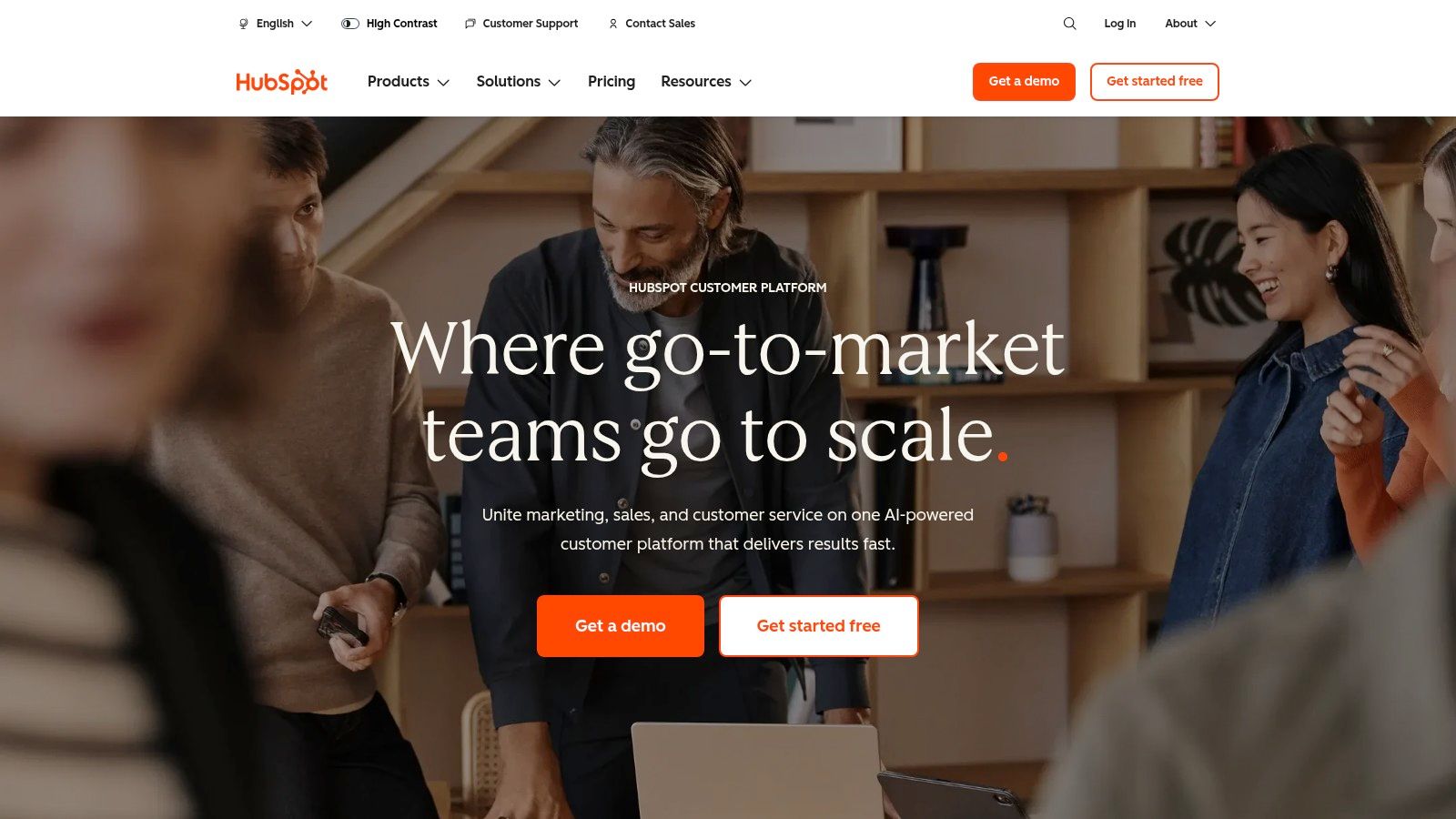
The system operates on a credits model, where "Breeze credits" are used to populate properties like industry, employee count, and annual revenue. While basic enrichment (like company name from a domain) is often free, detailed firmographic data requires these credits, which are available in packs for HubSpot Pro and Enterprise customers. This model provides predictable spending and unified billing, positioning it as one of the most convenient data enrichment companies for existing HubSpot power users looking to activate their data seamlessly. For more on its features, visit the HubSpot website.
Key Features & Use Cases
| Feature | Best For | Implementation |
|---|---|---|
| Native HubSpot Enrichment | Sales & marketing teams on HubSpot Pro/Enterprise | In-app, no external integration needed |
| Credits-Based Model | Predictable enrichment spending | Purchase Breeze credit packs in-platform |
| Auto-Enrichment | Automating lead qualification & segmentation | Configure via HubSpot workflows and settings |
Pros:
- Zero-friction setup for organizations already using HubSpot.
- Predictable credit packs and unified billing within your existing HubSpot subscription.
- Native governance and activity logging, keeping all data operations within one platform.
Cons:
- Requires a HubSpot Pro or Enterprise plan to utilize the credits-based enrichment.
- Lacks the flexibility and advanced data points of standalone providers if your stack isn't centered on HubSpot.
4. Apollo.io
Apollo.io has emerged as a major player among data enrichment companies, particularly for SMB and mid-market teams seeking a powerful yet accessible B2B data solution. It combines a massive contact database with sales engagement tools, but its enrichment capabilities stand out for their flexibility. Users can leverage its API, CSV uploads, or native CRM integrations to enhance lead, contact, and account records with comprehensive firmographic and demographic data.
What makes Apollo.io distinct is its transparent, self-serve model. Teams can get started with a free tier and scale into paid plans with clearly defined credit usage, a stark contrast to the enterprise-only sales cycles of many competitors. This accessibility, combined with robust API documentation, makes it a popular choice for teams that need to implement enrichment workflows quickly without significant upfront investment or lengthy procurement processes. For those looking to get started, you can explore their platform directly at apollo.io.
Key Features & Use Cases
| Feature | Best For | Implementation |
|---|---|---|
| API & CSV Enrichment | Enriching custom databases or one-off list cleaning | REST API or manual CSV upload/download |
| Real-Time CRM Sync | Automating lead data population in sales funnels | Native Salesforce/HubSpot integrations |
| Waterfall Enrichment | Maximizing data fill rates for critical fields | In-platform configuration combining Apollo and other sources |
Pros:
- Transparent, self-serve pricing with a generous free tier, making it accessible for smaller teams.
- Strong native integrations with major CRMs like Salesforce and HubSpot.
- Flexible workflows supporting API, CSV, and direct CRM enrichment.
Cons:
- Credit consumption rules can be nuanced, requiring careful management to avoid unexpected costs.
- Extremely high-volume or enterprise-wide use cases may find the top-tier plans less cost-effective than dedicated enterprise vendors.
5. People Data Labs (PDL)
People Data Labs (PDL) positions itself as a developer-first B2B data provider, making it one of the more accessible data enrichment companies for engineering and data teams. Its core offerings are a suite of APIs for person, company, and IP enrichment, alongside powerful search and autocomplete functionalities. The platform is designed for programmatic integration, prioritizing clear documentation, a self-serve model with free trial credits, and transparent, per-credit pricing that simplifies budget planning for technical projects.
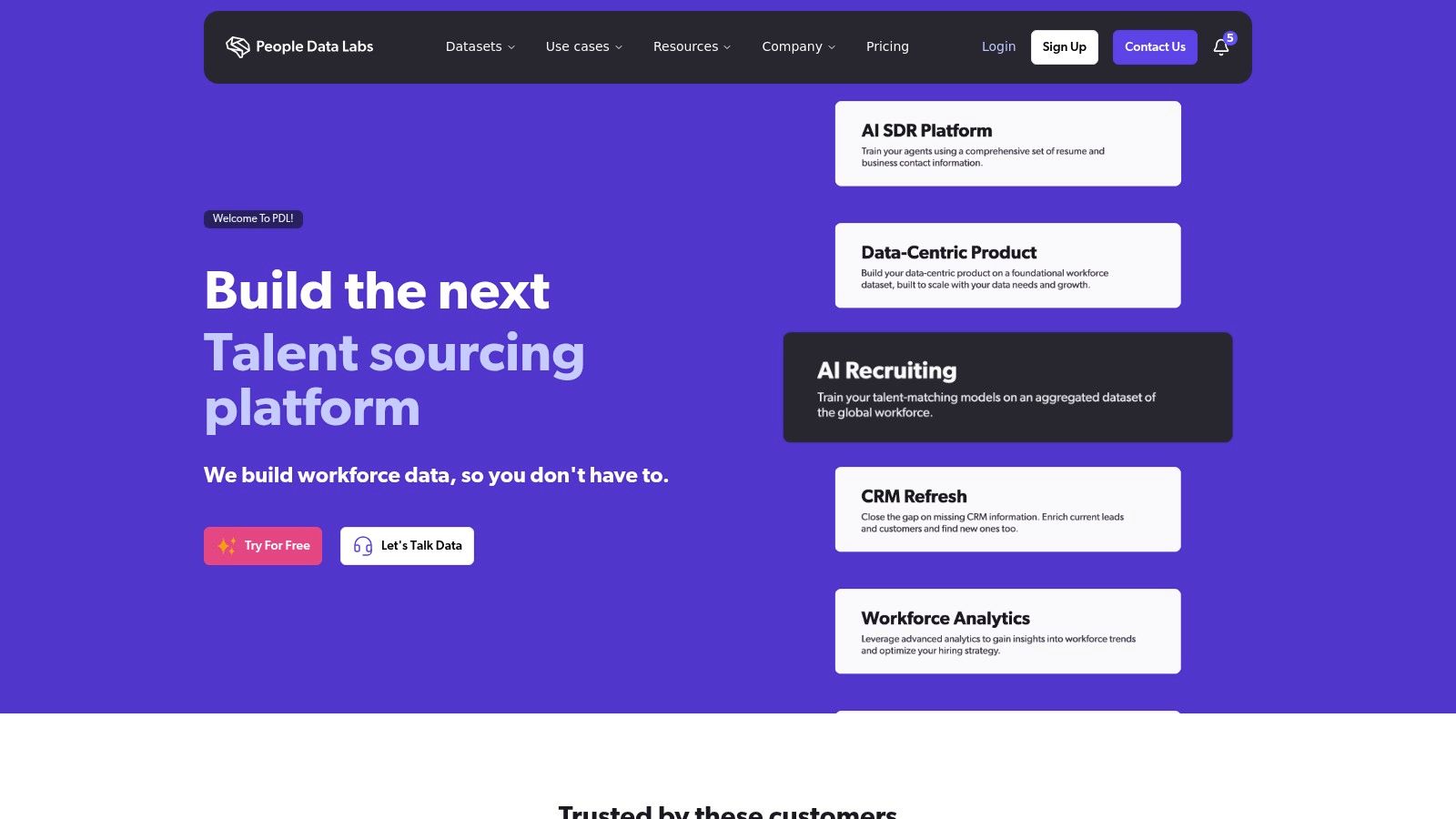
This engineering-centric approach allows teams to quickly build and test data enrichment workflows in a sandbox environment before committing to a paid plan. PDL also offers a no-code Batch Enrich tool, providing a UI for bulk data cleansing or one-off list uploads without requiring development resources. This flexibility makes it a strong contender for teams that need both deep API control and occasional no-code simplicity. You can explore their tools directly at People Data Labs.
Key Features & Use Cases
| Feature | Best For | Implementation |
|---|---|---|
| Person & Company APIs | Recruiting, identity verification, sales intelligence | Direct API integration, Python/Node.js libraries |
| Batch Enrich UI | Cleaning marketing lists, database hydration | No-code file upload (CSV) |
| Transparent Credit Model | Predictable budget planning, startups | Self-serve plans or enterprise contracts |
Pros:
- Very clear per-credit pricing and detailed documentation empower engineers.
- Strong developer-first experience with a free trial and sandbox environment.
- Datasets are available via AWS Data Exchange, offering an alternative procurement channel.
Cons:
- Access to premium data fields and comprehensive contact information requires paid plans.
- Minimums on batch jobs and certain add-ons can increase the total cost for smaller-scale use cases.
6. Enigma
Enigma is a specialized B2B identity platform with a strong focus on enriching data for Small and Medium-sized Businesses (SMBs) in the United States. Unlike broader sales intelligence tools, Enigma provides granular, attribute-level data geared towards financial and risk use cases like Know Your Business (KYB) and underwriting. As one of the more niche data enrichment companies, its strength lies in delivering verified business signals through a flexible API and a self-service console.

The platform offers a developer-friendly entry point with both GraphQL and REST APIs, alongside a batch append feature for cleansing existing datasets. Its pay-as-you-go pricing, based on credits consumed per attribute, presents a low barrier to entry for teams needing specific data points without a large upfront commitment. This makes it a compelling choice for fintechs, lenders, and compliance teams that require precise, verified financial and firmographic data to automate onboarding and risk assessment for the SMB segment. You can learn more at Enigma's website.
Key Features & Use Cases
| Feature | Best For | Implementation |
|---|---|---|
| Attribute-Level Data | Fintech KYB/KYC, SMB underwriting | GraphQL/REST API for real-time lookups |
| Batch Append & Console | Cleansing SMB datasets, manual verification | Self-service console upload |
| Entity Matching | Resolving and deduplicating business identities | API-driven entity resolution logic |
Pros:
- Fine-grained, attribute-level pricing and a low barrier to start with free monthly calls.
- Strong coverage of US-based SMBs with a focus on KYB-relevant attributes.
- Simple onboarding process via a self-service console and well-documented APIs.
Cons:
- The attribute credit model can be complex to forecast costs for initially.
- Identifiers are not guaranteed to be persistent, requiring careful mapping on the user's end.
7. Dun & Bradstreet (D&B)
Dun & Bradstreet is a long-standing authority in the B2B data space, renowned for its proprietary D-U-N-S Number, a unique identifier for businesses. As one of the foundational data enrichment companies, D&B provides deep firmographic and corporate hierarchy data through its D&B Direct+ APIs and various platform integrations. This allows enterprises to standardize and enrich their account data, ensuring consistency across global operations and systems.
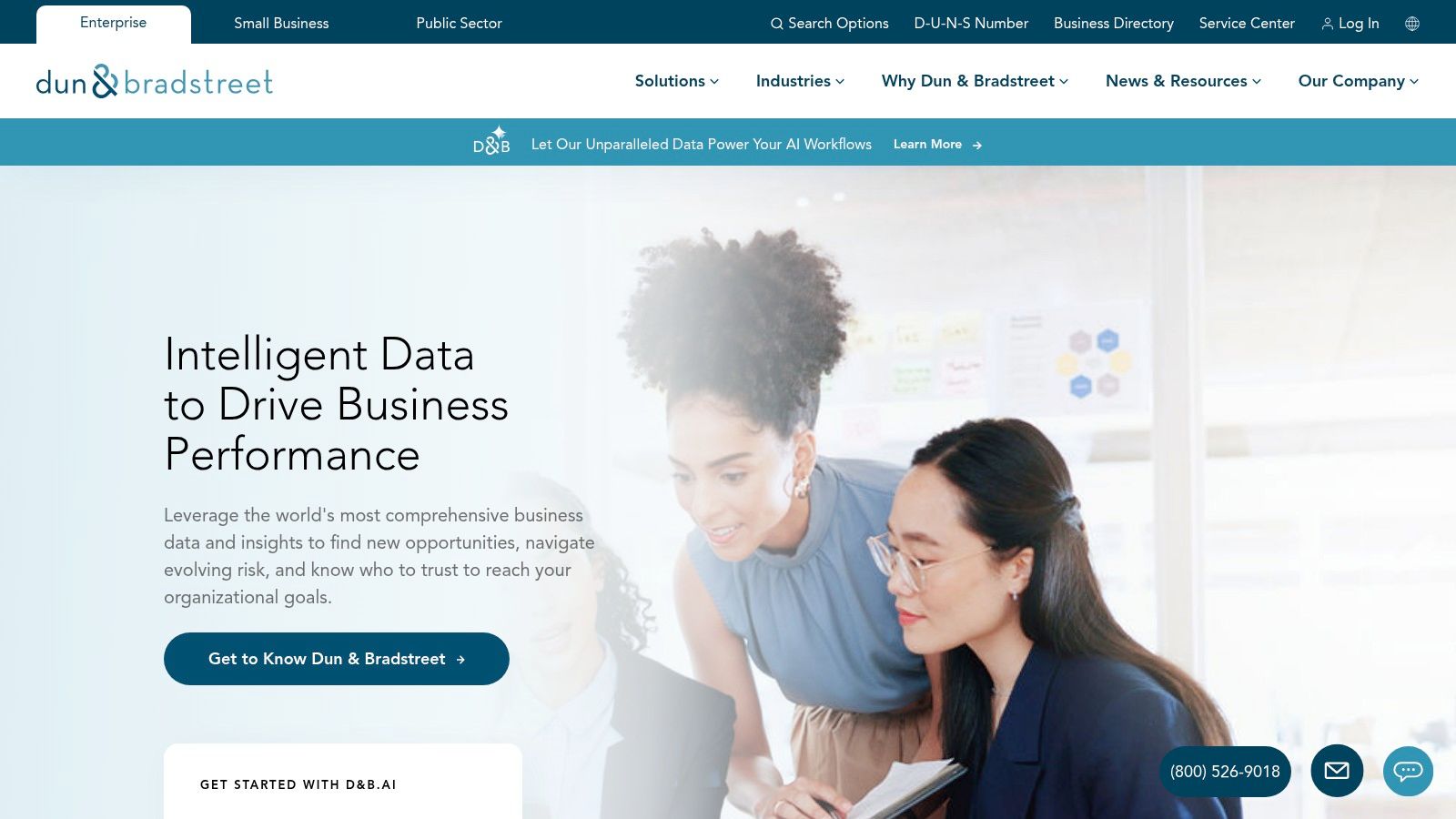
The company’s offerings extend beyond a simple API, including native connectors for enterprise systems, Excel add-ins for analysts, and the Rev.Up ABX/CDP platform for activating enriched data in marketing and sales campaigns. This makes D&B a strong choice for large organizations that require a globally recognized data standard for risk, compliance, and go-to-market functions. For a closer look at their API capabilities, you can find more details in this guide to company information APIs.
Key Features & Use Cases
| Feature | Best For | Implementation |
|---|---|---|
| D-U-N-S Number & Hierarchy | Master data management, supply chain | D&B Direct+ API, native CRM connectors |
| Firmographic Enrichment | Credit risk assessment, account segmentation | API, batch processing, Excel add-ins |
| Rev.Up ABX/CDP | Activating enriched data for ABM campaigns | Integrated D&B data platform |
Pros:
- Industry-standard identifiers and deep corporate hierarchy resolution.
- Broad enterprise integrations and tooling, including Microsoft Office/Excel.
- Strong reputation and recognition in analyst coverage and certifications.
Cons:
- Pricing is sales-led and can be premium, tailored for enterprise budgets.
- Setup and integration often require dedicated IT or developer resources.
8. Experian Data Quality (Aperture/Data Enrichment)
Experian is a global credit reporting agency whose data quality division offers sophisticated consumer and business enrichment. As one of the most established data enrichment companies, its strength lies in appending deep demographic, behavioral, and financial attributes, particularly from its ConsumerView database in the US. The platform supports both real-time API calls for on-demand enrichment and managed batch services for large-scale data cleansing and segmentation projects.

This dual-delivery model makes Experian suitable for organizations with varying technical capabilities. Developers can use the API Hub for direct integration, while marketing teams can leverage professional services for complex modeling and segmentation without writing code. The platform is best suited for enterprises in finance, retail, and marketing that require highly granular consumer data for risk assessment, personalization, and targeted campaigns. Access to the platform is sales-led, requiring custom contracts and a thorough vetting process due to the sensitive nature of the data.
Key Features & Use Cases
| Feature | Best For | Implementation |
|---|---|---|
| ConsumerView Data Append | Deepening B2C customer profiles | Real-time REST API or managed batch service |
| Real-Time Enrichment API | Onboarding verification, instant personalization | Direct API integration via Developer Portal |
| Professional Services | Advanced segmentation, predictive modeling | Managed service engagement with Experian team |
Pros:
- Extensive US consumer data coverage with up to 900 attributes available for appending.
- Flexible delivery model combines self-serve APIs with professional services for non-technical teams.
- Leverages Experian's established data quality and validation tooling (Aperture).
Cons:
- Pricing is not transparent and requires a direct sales engagement, often with long-term contracts.
- Access to regulated or sensitive financial attributes involves significant governance and compliance overhead.
9. Melissa
Melissa is a long-standing data quality and enrichment provider best known for its robust address, phone, and email verification services. Beyond simple validation, Melissa positions itself as one of the key data enrichment companies by offering a wide array of APIs and tools to append consumer, firmographic, and property data to existing records. Its solutions cater to a broad audience, from developers needing API access to business users leveraging Excel add-ins for list cleaning.
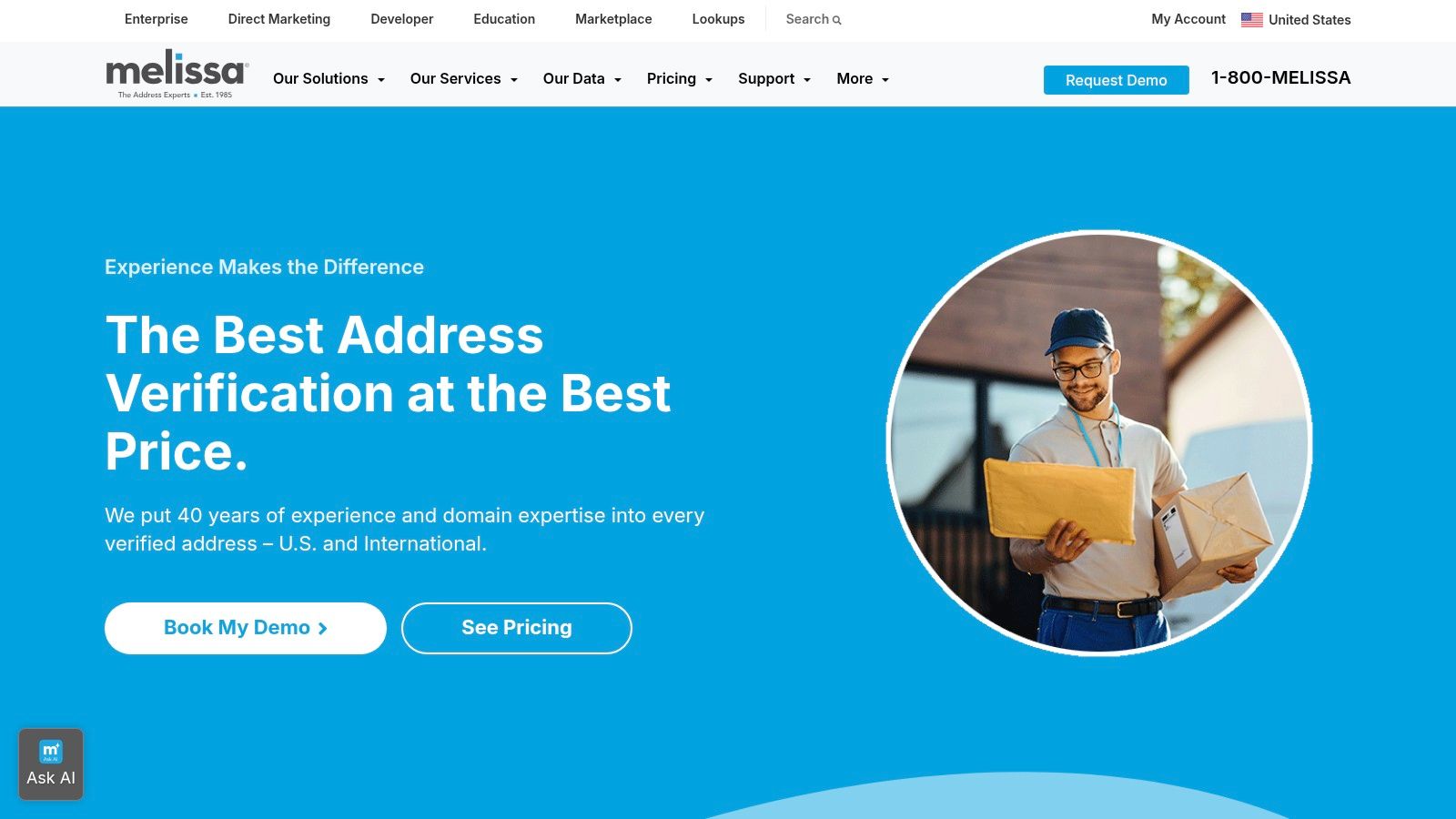
The company operates on a transparent credit-based, pay-as-you-go model, which makes it accessible for projects of any scale. This flexibility allows teams to start with a small batch or integrate real-time enrichment without committing to a large annual contract. Melissa’s offerings, such as Personator for consumer data and BusinessCoder for firmographics, provide a comprehensive toolkit for applications in direct marketing, compliance, and identity verification. For those looking to get started, you can explore the Melissa Data API solutions.
Key Features & Use Cases
| Feature | Best For | Implementation |
|---|---|---|
| Personator & BusinessCoder | Appending consumer/firmographic data | API or SaaS tools (Listware) |
| Address & Geocoding | E-commerce, logistics, compliance | Real-time API, batch processing |
| Alert Service | Maintaining database accuracy over time | API integration for monitoring changes |
Pros:
- Clear US-focused pricing tiers and an easy-to-start credit system.
- Broad enrichment menu covering consumer, business, and property data.
- Offers free monthly lookup credits after a small KYC verification fee.
Cons:
- Credit accounting across different products can be detailed and complex to track.
- Some advanced or enterprise SKUs require contacting a sales representative.
10. Lusha
Lusha is a B2B contact enrichment platform known for its simplicity and accessibility, making it popular among sales and marketing teams in the SMB segment. While its browser extension is a primary entry point for many users, its API provides the programmatic capabilities needed to classify it among strong data enrichment companies. Teams can integrate Lusha to enrich records with direct-dial phone numbers and verified business emails, supporting both on-demand and bulk workflows.
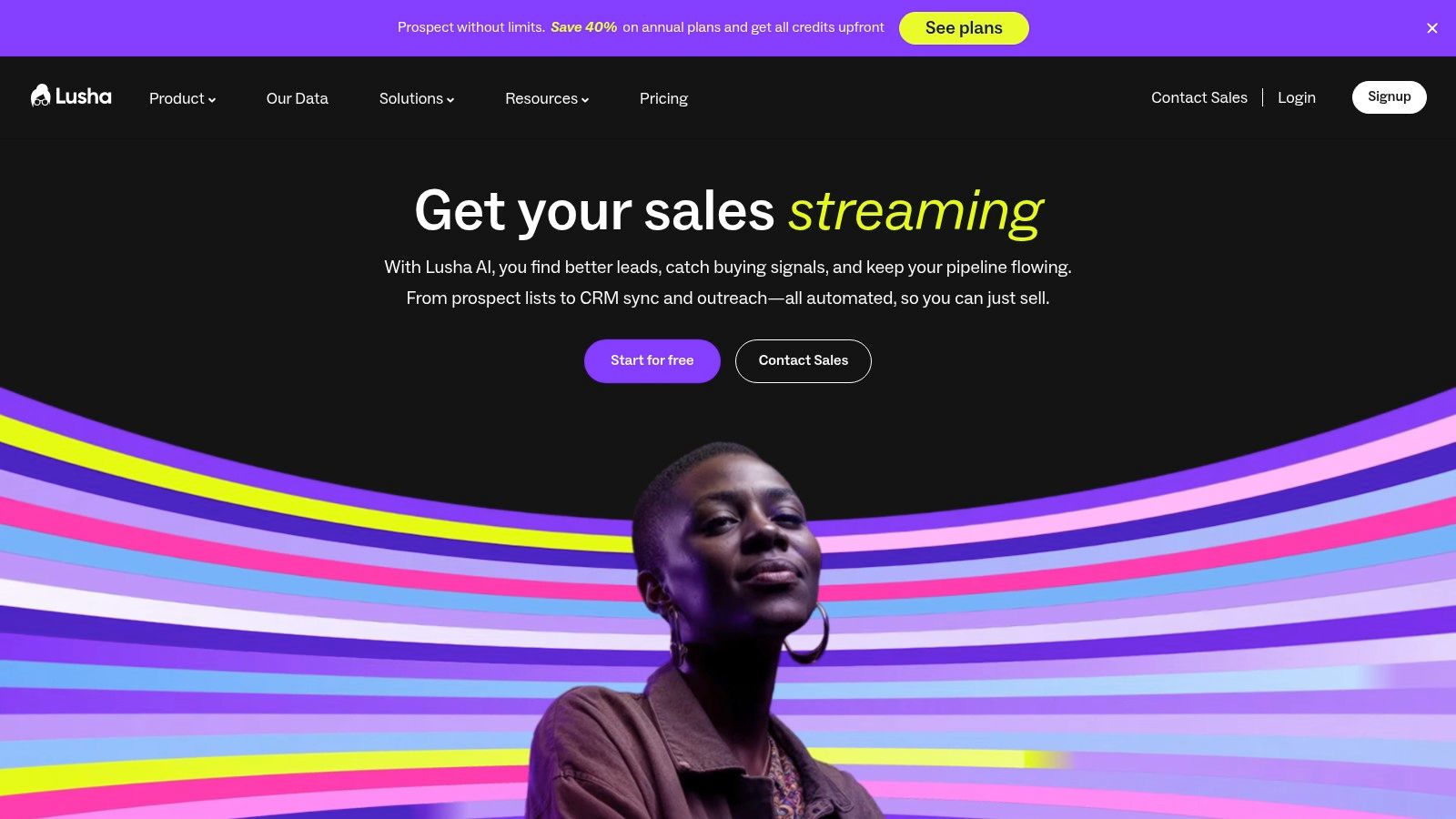
The platform operates on a transparent credit-based model, where users purchase credits and consume them per data reveal. This straightforward pricing, including a free tier with monthly credits, makes it easy for teams to trial the service and scale as needed. Lusha’s API allows developers to automate contact retrieval within their applications, streamlining lead generation and data hygiene processes without the need for complex enterprise contracts. For more details on its offerings, visit the Lusha website.
Key Features & Use Cases
| Feature | Best For | Implementation |
|---|---|---|
| Contact & Email Enrichment | Sales prospecting, lead qualification | Browser extension, API, bulk CSV upload |
| API Access | Automating lead enrichment in CRMs/apps | REST API for direct integration |
| Credit-Based Pricing | Teams needing flexible, pay-as-you-go data | Free trial and tiered subscription plans |
Pros:
- Very easy to get started with a free plan and intuitive browser extension.
- Transparent credit-based pricing makes costs predictable for contact lookups.
- Solid API for programmatic enrichment and integration into custom workflows.
Cons:
- Less depth in company-level firmographic data compared to enterprise-focused providers.
- Credits may still be consumed for API calls that do not return a match, representing a minimum charge.
11. Cognism
Cognism is a B2B intelligence platform known for its compliance-led approach, making it one of the key data enrichment companies for businesses operating in strict regulatory environments like EMEA. Its core enrichment offerings, "Enhance" and "Enrich," are delivered via CSV upload, API, and native CRM integrations. This allows sales and marketing teams to append critical contact and company data, including hard-to-find mobile numbers, directly into their systems of record.
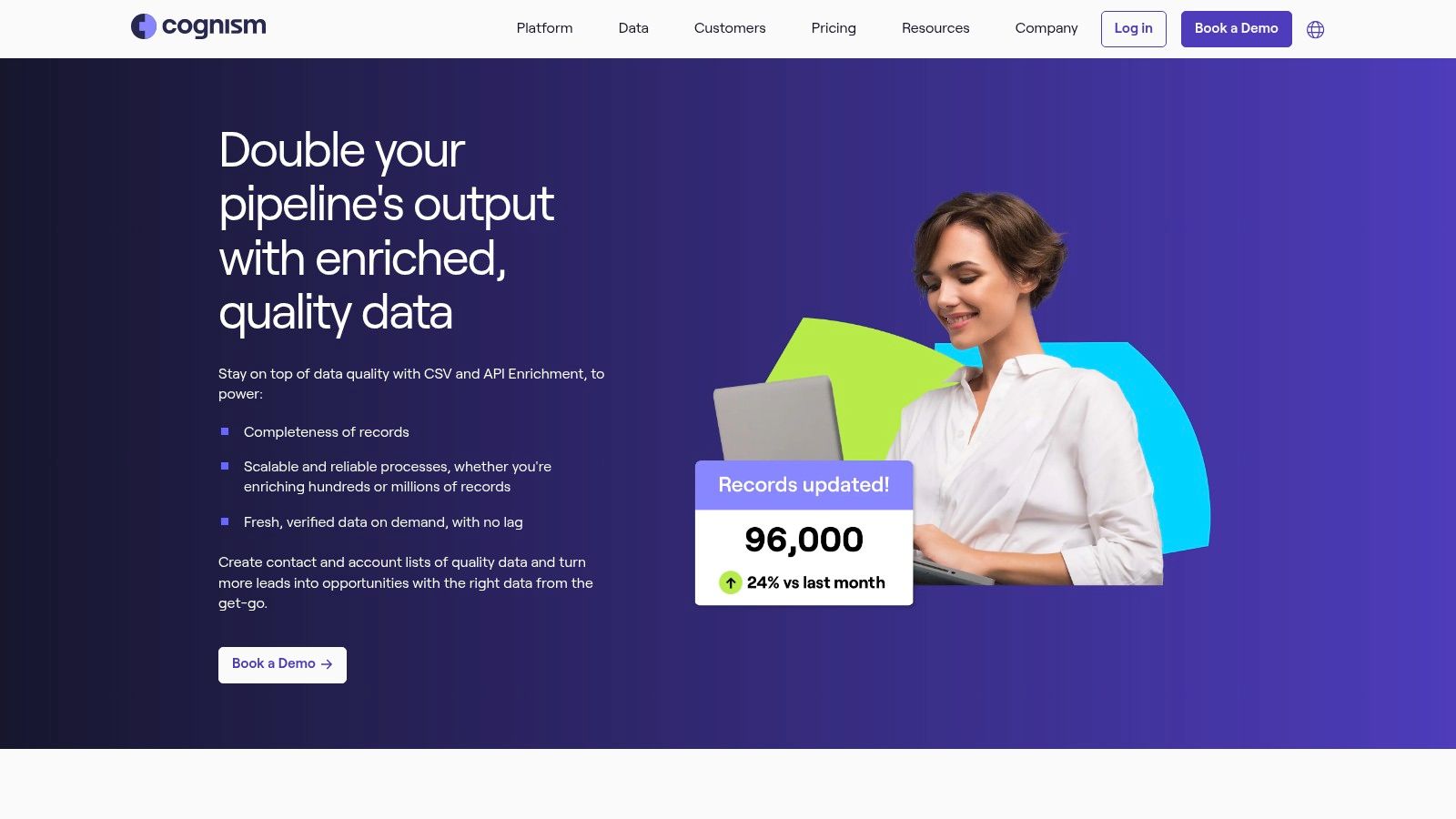
The platform focuses on operational efficiency through automated workflows that keep CRM data fresh and accurate. A standout feature on premium tiers is its phone-verified mobile numbers, which undergo human verification to increase connection rates for sales teams. While historically stronger in EMEA, Cognism has been expanding its US data coverage, positioning itself as a strong global contender for go-to-market teams. You can learn more about their specific enrichment capabilities at Cognism Enrich.
Key Features & Use Cases
| Feature | Best For | Implementation |
|---|---|---|
| CSV & API Enrichment | Cleansing marketing lists, enriching lead databases | Bulk CSV uploads, REST API for real-time calls |
| CRM Delivery Workflows | Automating data hygiene in Salesforce | Native Salesforce "Instant Enrich" & workflows |
| Phone-Verified Numbers | Sales teams focused on direct dial outreach | Premium data packages within the platform |
Pros:
- Strong compliance posture designed for EMEA and global data privacy regulations.
- Excellent phone and mobile data accuracy, particularly on higher-tier plans.
- User-friendly workflows for both bulk CSV enrichment and automated CRM updates.
Cons:
- Pricing is quote-based and requires engaging with their sales team.
- While growing, its US data coverage can be less comprehensive than some North American-focused competitors.
12. AWS Data Exchange
AWS Data Exchange is not a direct data provider but a centralized marketplace where businesses can find, subscribe to, and use third-party data sets directly within the Amazon Web Services cloud. Its position as one of the key data enrichment companies comes from its role as an aggregator, offering a streamlined way to procure B2B, firmographic, geospatial, and risk data from numerous vendors. This approach simplifies data acquisition for teams already embedded in the AWS ecosystem.
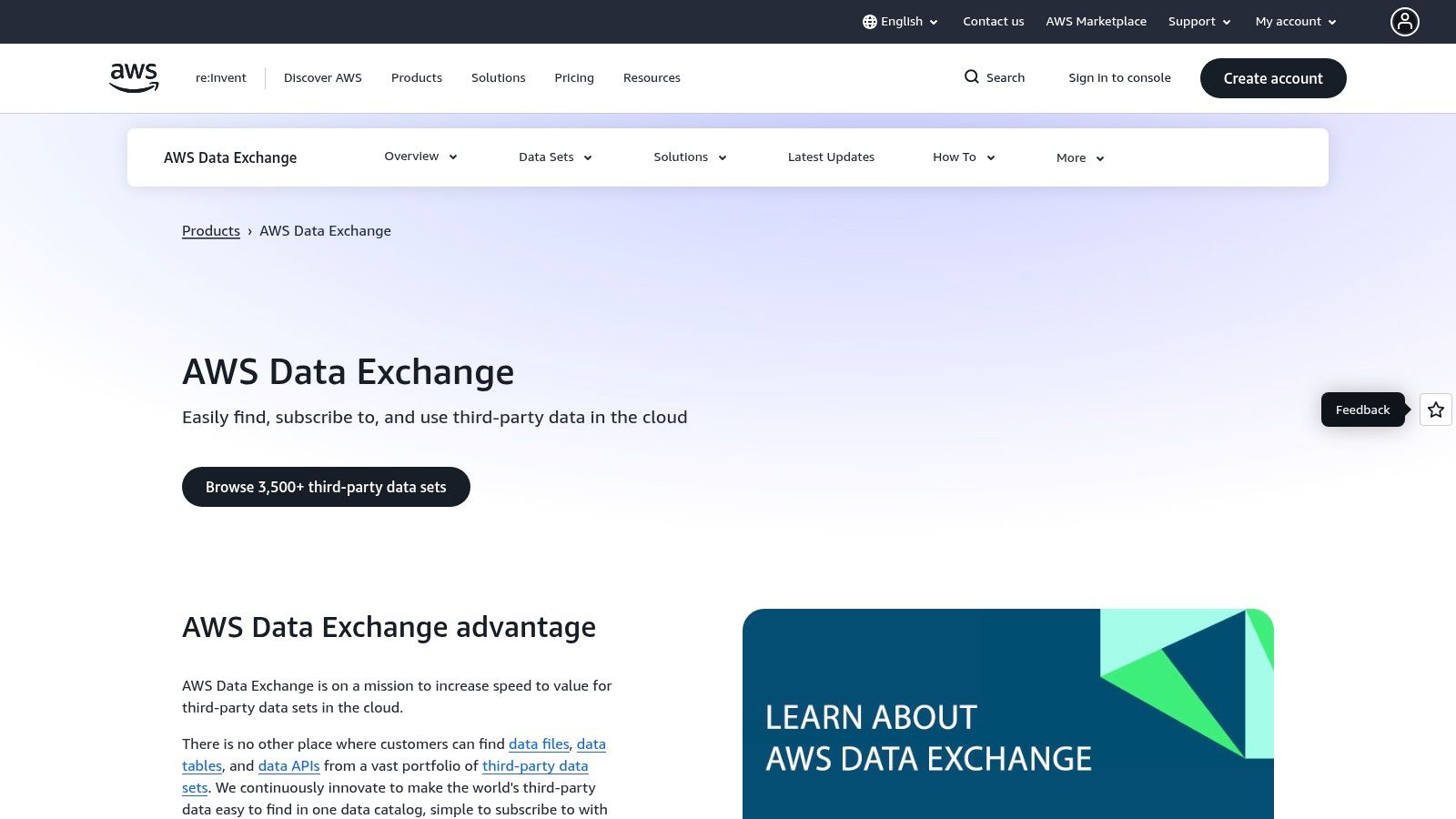
The platform is designed for technical users who can leverage subscribed data directly in services like Amazon S3, Redshift, and Athena for analytics or machine learning workflows. Billing is consolidated through an existing AWS account, supporting subscription, pay-as-you-go, and free data models. The value proposition is less about a single data source and more about providing a unified procurement and delivery pipeline for various enrichment needs. You can learn more about how to access provider data through a company data API on the exchange.
Key Features & Use Cases
| Feature | Best For | Implementation |
|---|---|---|
| Data Marketplace | Procuring diverse third-party datasets | Subscription via AWS Marketplace console |
| Direct AWS Integration | Analytics, ML model training, data warehousing | Data delivered to S3, Redshift, or Athena |
| Consolidated Billing | Simplifying vendor management | Charges appear on the monthly AWS bill |
Pros:
- Streamlined procurement and delivery directly into the AWS analytics and ML stack.
- Mixture of free, open, and paid commercial products, offering flexibility.
- Many prominent data providers list their datasets and enrichment products on the marketplace.
Cons:
- Requires an AWS account and familiarity with its services and billing structure.
- Data quality and format vary significantly by listing, so each provider must be evaluated individually.
Top 12 Data Enrichment Providers Comparison
| Product | Core offering | Dev experience & integration | Target audience | Unique strengths | Pricing & access |
|---|---|---|---|---|---|
| Brand.dev | Single API brand kits: logos, colors, typography, styleguides, backdrops, company metadata | Developer-first SDKs (TS/Python/Ruby), live demos, fast self-serve integration (<30m) | Product teams, growth/onboarding, fintech, AI/LLM workflows | Full styleguides (fonts/typography), single-query by domain/name/ticker, transaction ID & NAICS, Zapier | Self‑serve API keys; review pricing/limits for production |
| ZoomInfo | B2B contacts, firmographics, technographics, intent signals | APIs, exports, deep CRM (Salesforce/HubSpot) integrations and governance | Enterprise GTM & sales teams | Very large US coverage; intent signals; mature admin tooling | Sales‑led, annual contracts; can be premium |
| HubSpot Breeze Intelligence | Native company/contact enrichment inside HubSpot (credits) | Built into HubSpot UI with unified logging/governance | Teams on HubSpot Pro/Enterprise | Zero friction for HubSpot users; unified billing & admin | Credits model via HubSpot; requires Pro/Enterprise |
| Apollo.io | B2B DB + API/CSV, CRM sync, waterfall enrichment | REST API, self‑serve, clear docs, free trial | SMBs and mid‑market sales/ops teams | Transparent self‑serve access; flexible CSV/API workflows | Consumption credits; self‑serve tiers |
| People Data Labs (PDL) | Person, Company, IP enrichment + Search & Batch Enrich | Developer‑first docs, sandbox, no‑code batch UI | Engineers and data teams | Transparent per‑credit pricing; strong docs & sandbox | Per‑credit pricing; free trial credits |
| Enigma | SMB business identity & financial activity enrichment | GraphQL/REST, self‑service Console, batch append | KYB/KYC workflows; SMB-focused products | Attribute-level pricing; SMB coverage; free monthly calls | Pay‑as‑you‑go credits per attribute; low entry |
| Dun & Bradstreet (D&B) | Firmographics, hierarchies, D‑U‑N‑S, enterprise enrichment | D&B Direct+ API, Excel/Office integrations, Rev.Up CDP | Large enterprises needing hierarchy & IDs | Industry‑standard IDs and hierarchy resolution; enterprise connectors | Sales‑led pricing; premium; enterprise setup |
| Experian Data Quality | Consumer & business enrichment (deep attributes) | Real‑time APIs, batch services, professional services | Consumer analytics, modeling, regulated use cases | Up to ~900 attributes; Aperture data quality tooling | Sales‑led contracts; governance for sensitive attrs |
| Melissa | Verification & enrichment: addresses, phones, emails, property | APIs, CRM/Excel integrations, change monitoring | Data hygiene, address/phone verification, global use | Clear credit pricing; broad verification & alerting | Transparent pay‑as‑you‑go credits; some enterprise SKUs |
| Lusha | B2B contact reveals (email/phone) via extension, web app & API | Browser extension + API; simple per‑reveal model | SMB sales reps and small GTM teams | Easy trial (free credits); simple reveal pricing | Credit‑based per reveal; free tier available |
| Cognism | CSV/API enrichment with signals and phone verification | CSV/API, Salesforce enrich workflows, compliance features | Sales teams, EMEA & global customers | Compliance posture for EMEA, hiring/funding signals, phone‑verified numbers | Sales‑led pricing; quote based |
| AWS Data Exchange | Marketplace for third‑party datasets & data products | Direct delivery to S3/Athena/Redshift; AWS billing | Engineering, data science, ML teams on AWS | Streamlined procurement & delivery into AWS analytics/ML | Varied (pay‑as‑you‑go or subscription); requires AWS account |
Turning Data Into a Competitive Advantage
Navigating the landscape of data enrichment companies reveals a clear truth: not all data is created equal, and neither are the providers who supply it. Throughout this guide, we've explored a diverse set of platforms, from developer-centric APIs like Brand.dev to comprehensive sales intelligence giants like ZoomInfo and specialized financial data providers like Enigma. The central theme is that the "best" solution is entirely contextual, hinging on your specific goals, existing technology stack, and the nature of the data you need to enhance.
Your journey from raw, incomplete data to actionable intelligence is a strategic one. For a sales team, it means having the precise contact and firmographic data from Apollo.io or Lusha to close deals faster. For a fintech application, it involves leveraging clean, verified business information to mitigate risk and improve compliance. And for a product team, it's about using a brand data API to create deeply personalized and visually engaging user onboarding experiences.
Key Takeaways for Selecting Your Data Partner
The decision-making process can feel overwhelming, but it becomes manageable when broken down into core evaluation criteria. As you compare the various data enrichment companies, keep these critical factors at the forefront of your assessment:
- Define Your Primary Use Case: Are you enriching B2B leads for a sales pipeline (ZoomInfo, Cognism), verifying consumer identities (Experian, Melissa), or programmatically integrating brand assets into your application (Brand.dev)? Your primary goal dictates which category of provider to focus on first. A solution optimized for sales intelligence will not be the right fit for an API-first product integration.
- Evaluate Data Quality and Freshness: Data is only valuable if it's accurate and up-to-date. Always conduct a pilot or trial to test a provider's data against your own sources. Pay close attention to fill rates for the specific attributes you care about most, and inquire about their data sourcing and refresh methodologies. Stale data can be more damaging than no data at all.
- Assess Integration and Developer Experience: The most powerful data is useless if it's difficult to access. For technical teams, the quality of an API, the clarity of its documentation, and the availability of SDKs are paramount. For business users, seamless integration with your existing CRM, MAP, and other core systems is non-negotiable.
Strategic Implementation and Future-Proofing
Once you've selected a provider, implementation becomes the next critical step. Start with a focused, high-impact project rather than attempting a company-wide data overhaul. This allows you to demonstrate ROI quickly and build momentum. For instance, enriching inbound leads to improve lead scoring or personalizing the first-run experience in your SaaS product are excellent starting points.
Furthermore, consider the long-term implications of your choice. As your company grows, will your data needs evolve? Choose a partner that not only solves today’s problem but also offers a path to scale. This could mean a provider with a broad set of APIs or one that continuously expands its data coverage. In sectors like finance, where regulations and market dynamics shift rapidly, this forward-looking approach is essential. Achieving a competitive advantage in today's financial landscape hinges on robust data-driven decision making for modern banking, a process significantly enhanced by data enrichment.
Ultimately, investing in the right data enrichment partner is an investment in a core competitive advantage. It empowers your teams to move from reactive decision-making to proactive, data-informed strategies. By transforming your raw data from a passive asset into an active driver of growth, you unlock new levels of efficiency, personalization, and customer value that will define your success in the market.
Ready to elevate your product's user experience with instant brand personalization? Brand.dev offers a simple, developer-first API that enriches your application with high-quality logos, colors, and other brand assets. See how our real-time data can transform your onboarding, integrations, and UI by trying the Brand.dev API for free today.